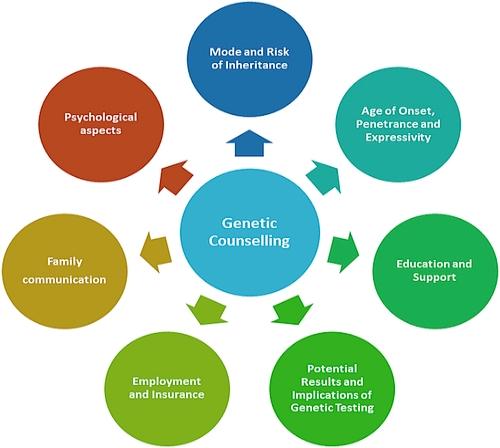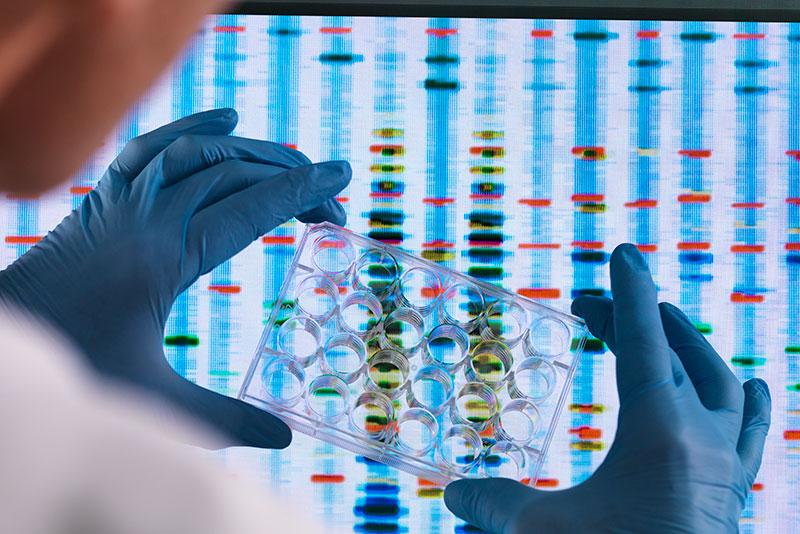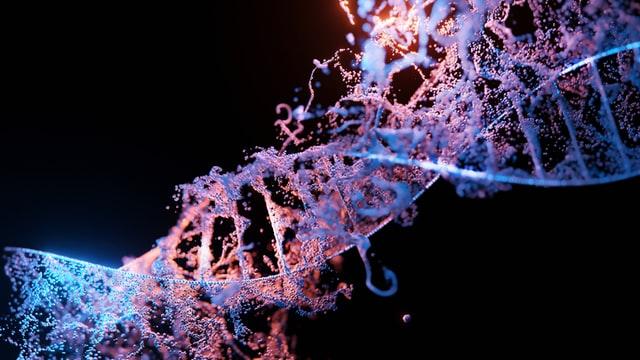Introduction
Families at risk of developing genetic disorders are candidates for genetic counseling. These possible changes in gene structure might have adverse effects if not identified in time for family members and future generations (Biesecker et al., 2019). Genes form the basic structure of humans and are responsible for determining the specific character traits that make individuals unique. With approximately 24,000 genes in a body, there develops a risk for certain conditions and diseases when any of them mutates (Centers for Disease Control and Prevention, 2020).
While a significant number of mutations have no health effects or contain positive attributes, a few can cause serious challenges including sickle cell disease and hemophilia (Pecker & Naik, 2018). Genetical counseling involves a number of steps to identify, test and educate individuals as shown in figure 1 below. Consequently, genetic counseling becomes crucial to identify such traits in individuals to allow adequate interventions or planning for their ultimate health effects.

Role of Genetic Counseling
Genetic counseling is essential in collecting the history and patterns to identify possible trends likely to cause inheritance. This develops the necessary data to calculate the chances of recurrence of certain genetic mutations in future generations (Mathiesen & Roy, 2018). Testing is done through comparison with normal DNA to identify potential defects as shown in figure 2 below. Aspects such as miscarriages and stillbirths in other family members can have an effect on a parent if they become inherited thus affecting the possibility of other pregnancies (Stevens, 2020). This therefore protects the health of a mother and provides alternatives during these initial stages of planning to raise a family.

Apart from that, genetic counseling can also provide information on possible health defects in the fetus during pregnancy. This is to identify any potential conditions in the baby that could affect them in infancy or early childhood as they grow and develop (Blesson & Cohen, 2020). Furthermore, any abnormal test results detected could identify possible problems in the mother that could affect the viability of the pregnancy (Reutter, 2021). Such counseling is recommended for all pregnant women to provide vital information that can assist in making decisions whether to terminate or proceed with the pregnancy especially in cases where extreme mutations likely to affect the infant’s life are detected.
Candidates for Genetic Counseling
Genetic counseling can be useful to individuals with family or close relatives who have confirmed genetic conditions. This can provide adequate family history that can determine the predisposition of an individual to inherit such a condition (Blesson & Cohen, 2020). Apart from that, parents with children diagnosed with genetic conditions can also use counseling to determine possible risks to future ones (Amendola et al., 2021). This is important to provide the parents with the necessary information that can advise their decisions on their planned future.
More so, pregnant women are also advised to undergo genetic counseling if they are above thirty-four years of age and have produced any form of abnormal screening during the prenatal stages (Perge & Igaz, 2019). Such mutations in genes are abnormal spots in DNA as shown in figure 3 below (Cirino et al., 2019). Further, women who have experienced miscarriages or stillbirths during earlier pregnancies are also great candidates for genetic counseling since they could be linked to genetic problems (Hoskovec & Stevens, 2018). This provides the opportunity to learn and identify problems based on their genes for future planning.

When Genetic Counseling is Recommended
Genetic counseling is important since it increases the knowledge of a family towards genetic conditions. In some cases, a family may have a history of misunderstood health problems that could have reoccurred across generations without proper medical diagnosis (LeRoy et al., 2020). In such cases, the benefits of such testing can be better explained to enable other family members to be tested and determine any other possible genetic problems.
Apart from that, counseling can help affected individuals to find the best psychosocial tools to assist with coping with any adverse results identified after testing. Counseling requires a trained individual who can talk humanely with a patient and discuss the outcomes as shown in figure 4. Therefore, finding the right methods to help in the transition to living with such conditions is important to prevent breakdowns that could further affect the family (Resta, 2019). Genetic counseling therefore forms a basis for future engagements that could be developed through the relationship between the counselor and family members.

Diseases Detected through Genetic Counseling
Ovarian, breast and colorectal cancer could be inherited by an individual if their family members were diagnosed with it. These types of cancers are caused by hereditary mutations in genes such as BRCA1 which can be passed on to other members of the family (Gardner et al., 2018). Apart from that, cystic fibrosis can also be detected through genetic screening. This condition is caused by gene mutations that result in difficulties in digestion and breathing especially in children due to mucus in the lung membranes as shown in figure 5 below (Zuckerman, 2021). Hemophilia, which is a disorder involving bleeding, can also be detected using genetics (Gardner et al., 2018). In such cases, affected individuals do not have the necessary functioning to assist with clotting.

Conclusion
Changes in gene structure might have adverse effects if not identified in time for family members. Therefore, genetic counseling becomes crucial to identify such genes in individuals to allow adequate interventions or planning for their ultimate health effects. This is useful to individuals with family, close relatives or children with confirmed genetic conditions and mothers who experienced miscarriage. Genetic counseling therefore increases the knowledge of a family towards genetic conditions and helps affected individuals to find the best psychosocial tools to assist with coping with outcomes.
References
Amendola, L. M., Golden-Grant, K., & Scollon, S. (2021). Scaling genetic counseling in the genomics era.Annual Review of Genomics and Human Genetics 22, 339-355. Web.
Arakelians, S. (2021). Pharmacy Clinical Pearl of the Day: Cystic Fibrosis.Pharmacy Times. Web.
Biesecker, B. B., Peters, K. F., & Resta, R. G. (2019). Advanced genetic counseling: Theory and practice. Oxford University Press.
Blesson, A., & Cohen, J. S. (2020). Genetic counseling in neurodevelopmental disorders.Cold Spring Harbor Perspectives in Medicine 10(4), Web.
Brooks, A. (2017). [Scientist holding a multi well plate used for genetic testing] [Stock image]. Alamy. Web.
Centers for Disease Control and Prevention. (2020). Genetic counseling. Centers for Disease Control and Prevention. Web.
Cirino, A. L., Seidman, C. E., & Ho, C. Y. (2019). Genetic testing and counseling for hypertrophic cardiomyopathy. Cardiology Clinics 37(1), 35-43. Web.
Gardner, R. J., Gardner, R. J., & Amor, D. J. (2018). Gardner and Sutherland’s chromosome abnormalities and genetic counseling. Oxford University Press.
Hoskovec, J. M., & Stevens, B. K. (2018). Genetic counseling overview for the obstetrician-gynecologist.Obstetrics and Gynecology Clinics of North America 45(1), 1–12. Web.
LeRoy, B. S., Veach, P. M., & Callanan, N. P. (2020). Genetic counseling practice: Advanced concepts and skills. John Wiley & Sons.
Lokare, S. (2022). [Image of DNA strand] [Stock image]. Unsplash. Web.
Mathiesen, A., & Roy, K. (2018). Foundations of perinatal genetic counseling. Oxford University Press.
Moharem-Elgamal, S., Sammut, E. & Stuart, G. (2020). Genetic counseling in inherited cardiomyopathies. Journal of the American College of Cardiology: Case Reports 2(3), 392-395.
Pecker, L. H., & Naik, R. P. (2018). The current state of sickle cell trait: Implications for reproductive and genetic counseling.Blood 132(22), 2331–2338. Web.
Perge, P., & Igaz, P. (2019). Family screening and genetic counseling. Experientia Supplementum 111, 29-32. Web.
Resta, G. R. (2019). What have we been trying to do and have we been any good at it? A history of measuring the success of genetic counseling.European Journal of Medical Genetics 62(5), 300-307. Web.
Reutter, M. H. (2021). Genetic counseling for birth defects. European Journal of Pediatric Surgery 31(6), 467. Web.
Stevens, B. (2020). Impact of emerging technologies in prenatal genetic counseling.Cold Spring Harbor Perspectives in Medicine 10(12). Web.
Zuckerman, S. (2021). The emergence of the “genetic counseling” profession as a counteraction to past eugenic concepts and practices. Bioethics 35(6), 528-539. Web.
Centers for Disease Control and Prevention. (2021). [An obstetrician consulting a pregnant patient] [Stock Image]. Unsplash. Web.